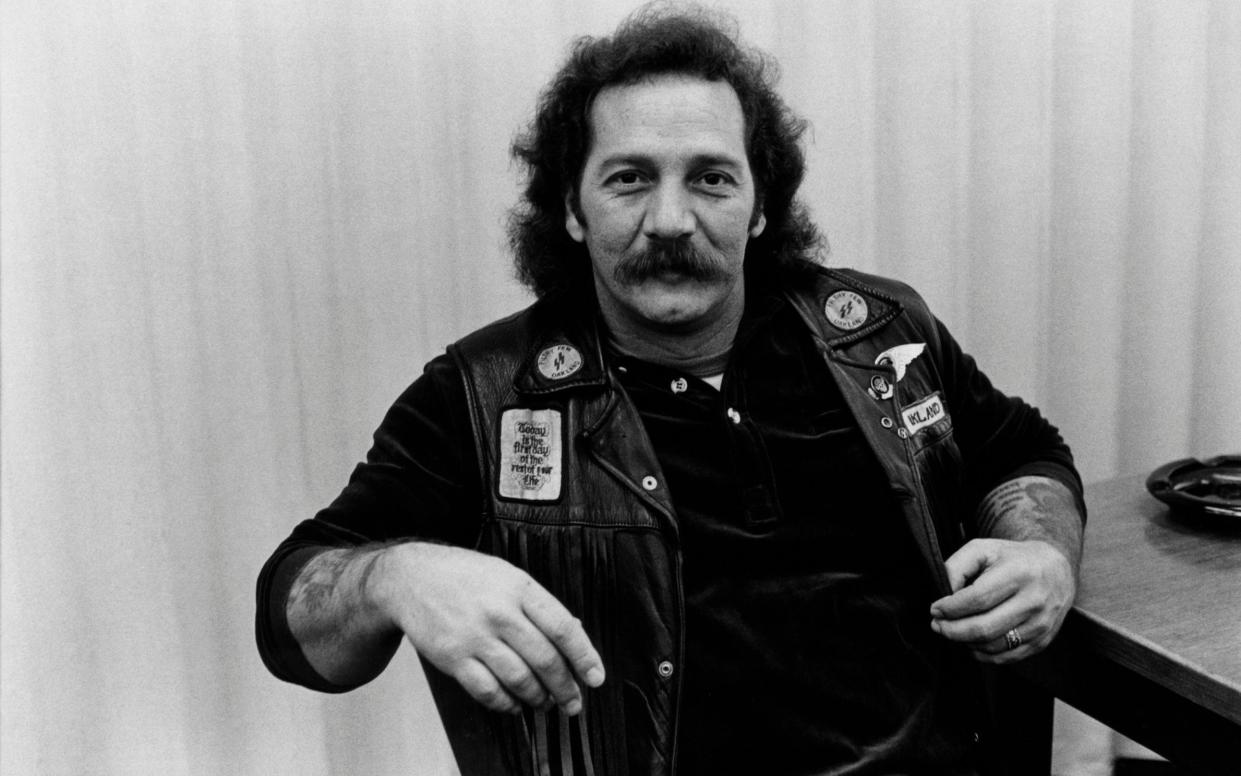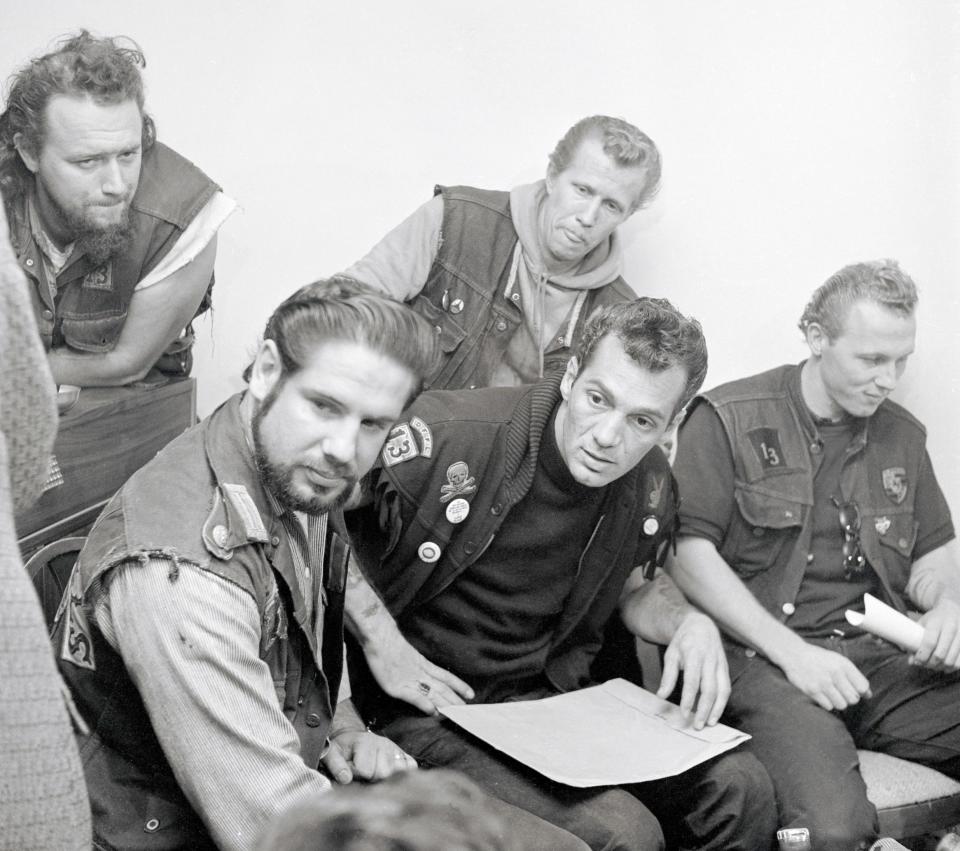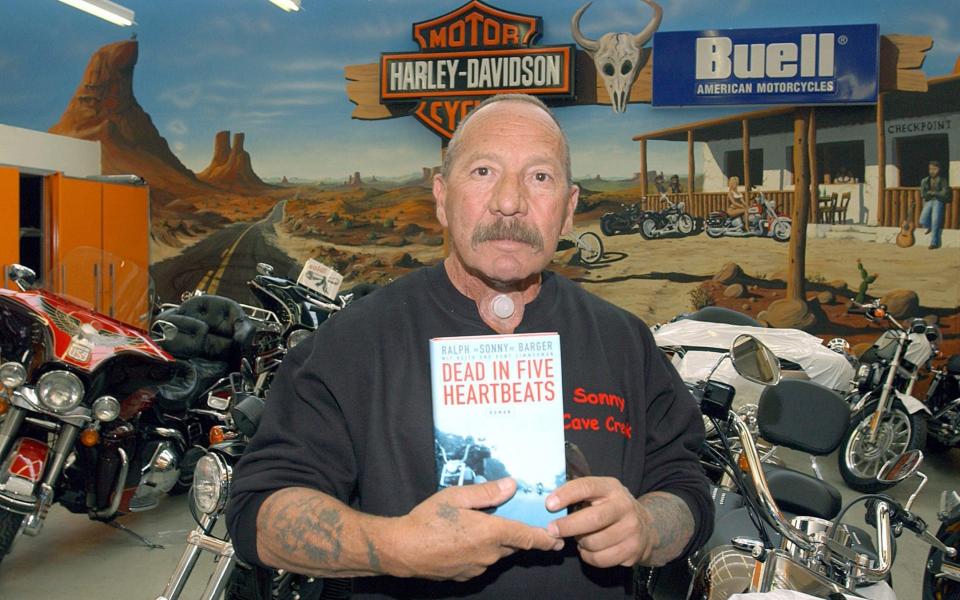Sonny Barger, who led the way as the Hells Angels grew from a local motorcycle club into one of the world’s most notorious gangs – obituary

Ralph “Sonny” Barger, who has died aged 83, was a mechanic and motorcycle repairshop owner who attained notoriety as the founder and president of the Oakland, California, chapter of the Hells Angels Motorcycle Club; under his leadership, the Angels grew from being a local curiosity to a moral panic – a piratical horde of wild-haired, bearded and tattooed men astride “chopped” (modified) Harley-Davidsons, trailing fear and loathing wherever they went.
The Angels gained international infamy in 1966 with the publication of Hunter S Thompson’s book Hell’s Angels: The Strange and Terrible Saga of the Outlaw Motorcycle Gangs. Thompson spent a year with the group drinking at their bars, exchanging home visits and quietly taking note of their brutalities, lauding Barger as “ ‘the Maximum Leader’ ... a tough, quick-thinking dealer when any action starts... a fanatic, a philosopher, a brawler, a shrewd compromiser and a final arbitrator”.
Apparently immune to flattery, Barger described the book as “total fake” and declared himself to be unimpressed by Thompson, accusing him of locking himself in the boot of his car to avoid joining a fight with police, and of provoking the beating he received from the gang (which almost killed the author) in order to provide a good story for his book.

The gang’s notoriety reached its height in 1969 at the Rolling Stones free concert at the Altamont Speedway in California, where a man was stabbed and beaten to death by Hells Angels just yards from where the Stones were performing on stage. Barger would later claim that his own part in the incident had been confined to sticking a gun into the ribs of a faltering Keith Richards and telling him “to start playing his guitar or he was dead”.
Ralph Hubert Barger was born in Modesto, California, on October 8 1938. Barger’s mother deserted the family when he was four months old, leaving him to be brought up by an alcoholic father and an older sister. A troublesome child, after being suspended from school several times for assaulting teachers and fighting, Barger enlisted in the army at the age of 16 – but was discharged 14 months later after it was discovered that he had forged his birth certificate.
He drifted between menial jobs and in 1956, inspired by the character of Chino, played by Lee Marvin in the seminal biker film The Wild One, joined a motorcycle club, the Oakland Panthers, but quit in disillusionment, claiming that he “felt no brotherhood. When the cops busted someone, he was on his own. What I needed was more solidarity and less cover your own ass. Sure, they’d party, but when the shit came down, they didn’t stick together. I needed a second family.”
In 1957 he founded the Oakland chapter of the Hells Angels. The first Hells Angels Motorcycle Club had been founded in southern California in 1947, made up partly of disaffected ex-servicemen returning from the war; they appropriated the name, and the winged-skull insignia they wore on their jackets, from a number of wartime air force squadrons.
Barger glorified the Hells Angels as “a very select brotherhood of men”, with its own brand of outlaw honour and justice, who would “fight and die for each other. It’s like a golden rule: when a Hells Angel fights a citizen or a rival club member, everybody rat-packs to his side.”

In the Sixties they became part of the counter-cultural patchwork of San Francisco, idealised by some as Rousseau-esque noble savages, tribunes of the American creed of rugged individuality. They were guests at the psychedelic “acid test” parties held by the author Ken Kesey on his property in the woods outside La Honda, where the Grateful Dead were the “house band”.
But the rapport between hippies and the biker gang was always uneasy. In 1965, Hells Angels attacked anti-war protesters at a demonstration in Berkeley, California. That same year Barger sent a letter to President Lyndon Johnson in support of the war in Vietnam, and volunteering “a group of loyal Americans for behind-the-line duty...We are available for training and duty immediately.”
He received a letter back from an officer stating that if they wanted to fight they would have to enlist in the army.

When the Rolling Stones planned a free concert at Altamont, it was the Grateful Dead’s road manager Rock Scully who, in the spirit of the times, suggested that it would be “natural, not to say organic” to entrust the security arrangements to the Angels.
The outcome was predictably catastrophic. Amid a mood of escalating terror, Angels attacked members of the audience with billiard cues, knocked the Jefferson Airplane singer Marty Balin unconscious and, in a horrifying denouement, stabbed to death Meredith Hunter, after the 18-year-old had brandished a gun.
Barger would later claim that the Angels had been “duped”, and that the audience had “started it” by “messing over our bikes.”
He said: “I didn’t go there to police nothin’, man, I ain’t no cop. I ain’t never gonna never pretend to be a cop, and this Mick Jagger, like, put it all on the Angels, man. They told me that if I could sit on the edge of the stage so nobody would climb over me I could drink beer until the show was over, and that’s what I went there to do... But when you’re standing there looking at something that’s your life, and you love that thing better than you love anything in the world and you see a guy kick it, you know who he is, you’re going to get him. And you know what? They got got. I am not no peace-creep by any sense of the word.”
Having spent a large part of the 1970s in prison on drugs charges, in 1982 Barger contracted throat cancer caused by years of heavy smoking. Following the removal of his vocal cords, he spoke through a valve in his throat, lending a further air of menace to his pensées on the Hells Angel life. (“If you’re going to beat someone, you should use an axe handle or baseball bat.”)

In later years, he consciously sought to downplay the Hells Angels’ violent reputation, claiming that their fearsome image was largely an invention of the police and the media. It was a claim that was somewhat undermined in 1988 when he was convicted of conspiring to blow up the clubhouse of a rival motorcycle club, the Outlaws, in Louisville, Kentucky, and served four years in federal prison in Arizona.
Barger put his name to several books, including an autobiography, Hell’s Angel: The Life and Times of Sonny Barger and the Hell’s Angels Motorcycle Club and a manual on motorcycle safety, Let’s Ride: Sonny Barger’s Guide to Motorcycling. Between 2010 and 2012 he had a recurring role in the Sons of Anarchy television series about an outlaw motorcycle club as Lenny “The Pimp” Janowitz.
Styling himself as an “American Legend”, he marketed a range of branded merchandise including T-shirts and Sonny Barger Cabernet Sauvignon ($50 a bottle). He was married four times and had a stepdaughter, whom he adopted. “She loves me,” he once said. “But I don’t know if I’d want to be my kid.”
Sonny Barger, born October 8 1938, died June 29 2022


